-
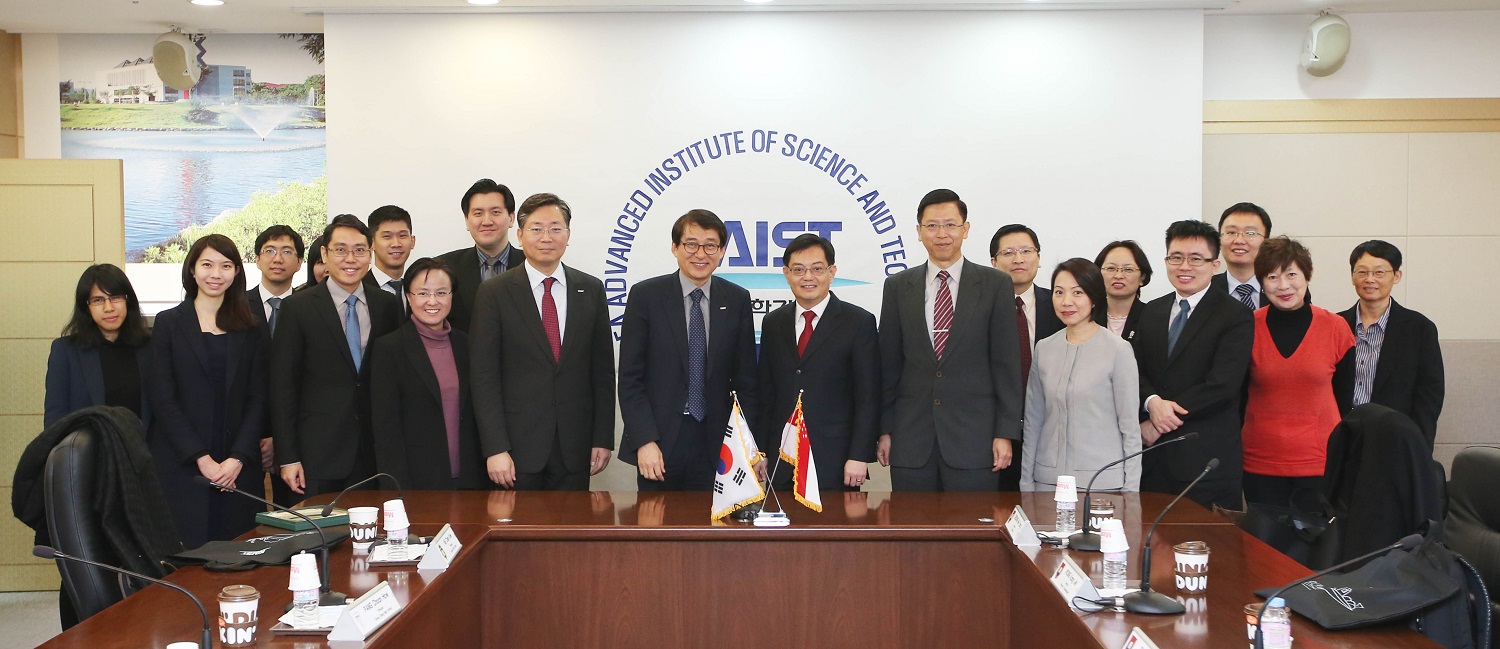 Singaporean Minister for Education Visits KAIST
Heng Swee Keat, the Minister for Education of Singapore, and his delegation visited KAIST on January 26, 2015, to discuss innovative education models being implemented by KAIST and future cooperation with Singaporean universities.
The visit included 21 key personnel responsible for higher and gifted educational programs in the Singaporean government.
Minister Heng showed great interest in KASIT's learner-focused teaching method, "Education 3.0," and graduate school-centered education. He said, "Singapore is in the process of making innovations in university education, for example, by offering more opportunities for global education such as joint programs with leading universities like MIT and Yale University in the US."
In the picture, Vice President for Planning and Budget Seung Bin Park (sixth from the left), KAIST, and Minister Heng Swee Keat (right next to Park) posed together.
2015.01.28 View 6568
Singaporean Minister for Education Visits KAIST
Heng Swee Keat, the Minister for Education of Singapore, and his delegation visited KAIST on January 26, 2015, to discuss innovative education models being implemented by KAIST and future cooperation with Singaporean universities.
The visit included 21 key personnel responsible for higher and gifted educational programs in the Singaporean government.
Minister Heng showed great interest in KASIT's learner-focused teaching method, "Education 3.0," and graduate school-centered education. He said, "Singapore is in the process of making innovations in university education, for example, by offering more opportunities for global education such as joint programs with leading universities like MIT and Yale University in the US."
In the picture, Vice President for Planning and Budget Seung Bin Park (sixth from the left), KAIST, and Minister Heng Swee Keat (right next to Park) posed together.
2015.01.28 View 6568 -
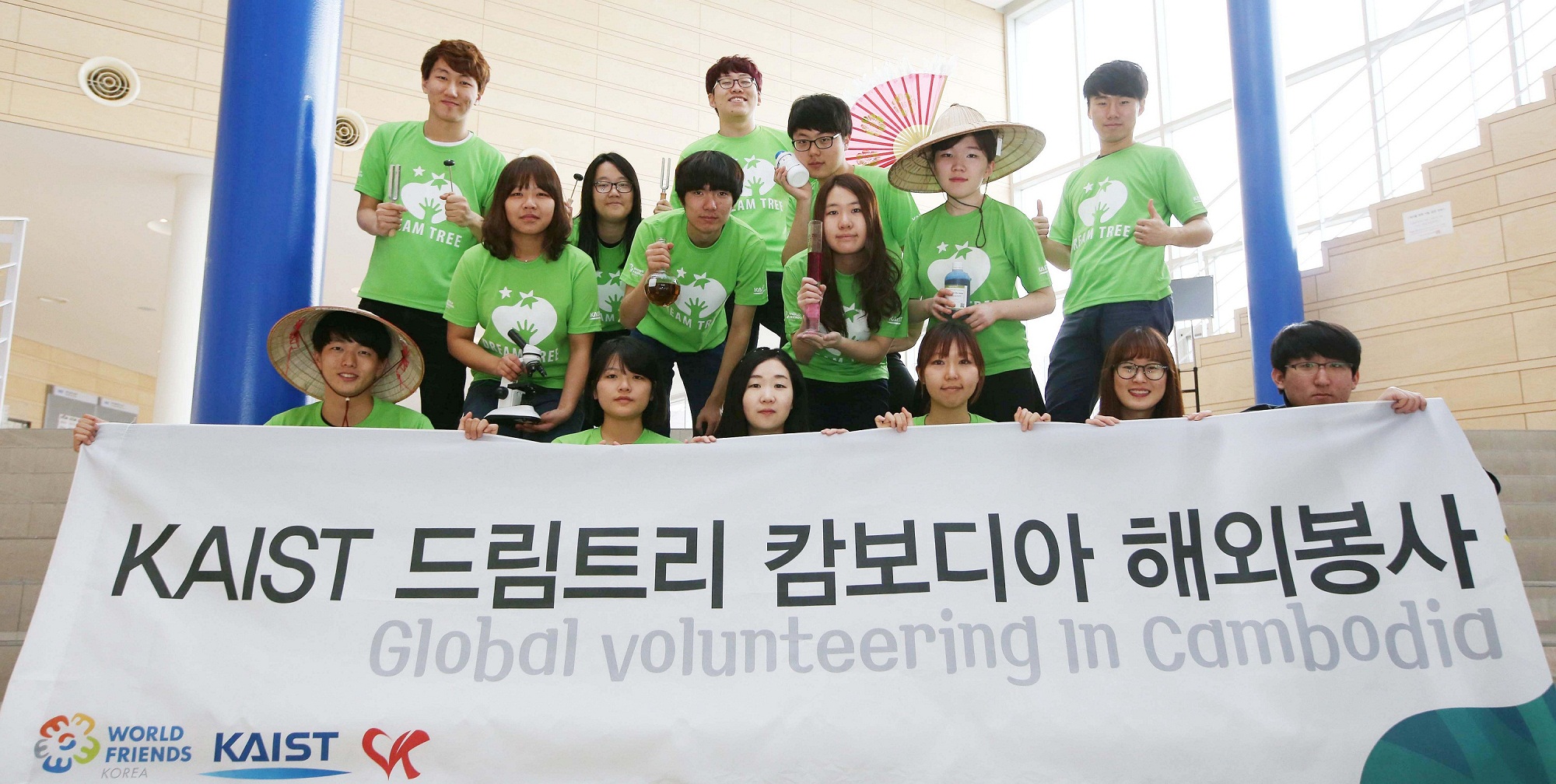 KAIST Students Volunteer in Cambodia
To provide science education for Cambodian high school students and to share Korean art and culture.
Cambodia was one of the 60 nations that joined the United Nations’ efforts to help South Korea during the Korean War in the 1950s. Now, a group of KAIST students starts a journey to return what that nation gave to Koreans so generously over six decades ago.
Initiated and planned by students, the volunteering project “KAIST Dream Tree Global Volunteering in Cambodia” offers science and math education to high school students in Cambodia for 11 days. The volunteer team is consisted of 15 undergraduate students and one faculty advisor, and they will work at Hosanna High School in Phnom Penh, Cambodia from January 24 to February 3, 2015.
With around 150 student participants from Hosanna High School, KAIST students will teach math, physics, chemistry, and biology. They will also provide an opportunity to learn about Korean art and culture, including Taekwondo, a Korean traditional martial art, mural painting, and Korean language.
As K-Pop (Korean pop music) and Korean movies and television dramas have become popular in Cambodia, KAIST students will perform musicals and host a singing contest together with Cambodian students for fun and enjoyment. In addition, students from both countries plan to create flower beds around the high school campus.
Prior to the KAIST team’s departure to Cambodia, the university held a small ceremony to support the students’ volunteer work. Attending the ceremony with other senior faculty members, President Steve Kang thanked the students. He said, “KAIST students have been receiving tremendous support from Korean citizens, and it’s great to see how our students are repaying their generosity by helping young people who are less privileged. I’m really proud of our students and hope that this tradition of sharing science knowledge and passion for science with the global community continues.”
The ceremony took place on January 19, 2015 at the Guesthouse on campus.
2015.01.27 View 7381
KAIST Students Volunteer in Cambodia
To provide science education for Cambodian high school students and to share Korean art and culture.
Cambodia was one of the 60 nations that joined the United Nations’ efforts to help South Korea during the Korean War in the 1950s. Now, a group of KAIST students starts a journey to return what that nation gave to Koreans so generously over six decades ago.
Initiated and planned by students, the volunteering project “KAIST Dream Tree Global Volunteering in Cambodia” offers science and math education to high school students in Cambodia for 11 days. The volunteer team is consisted of 15 undergraduate students and one faculty advisor, and they will work at Hosanna High School in Phnom Penh, Cambodia from January 24 to February 3, 2015.
With around 150 student participants from Hosanna High School, KAIST students will teach math, physics, chemistry, and biology. They will also provide an opportunity to learn about Korean art and culture, including Taekwondo, a Korean traditional martial art, mural painting, and Korean language.
As K-Pop (Korean pop music) and Korean movies and television dramas have become popular in Cambodia, KAIST students will perform musicals and host a singing contest together with Cambodian students for fun and enjoyment. In addition, students from both countries plan to create flower beds around the high school campus.
Prior to the KAIST team’s departure to Cambodia, the university held a small ceremony to support the students’ volunteer work. Attending the ceremony with other senior faculty members, President Steve Kang thanked the students. He said, “KAIST students have been receiving tremendous support from Korean citizens, and it’s great to see how our students are repaying their generosity by helping young people who are less privileged. I’m really proud of our students and hope that this tradition of sharing science knowledge and passion for science with the global community continues.”
The ceremony took place on January 19, 2015 at the Guesthouse on campus.
2015.01.27 View 7381 -
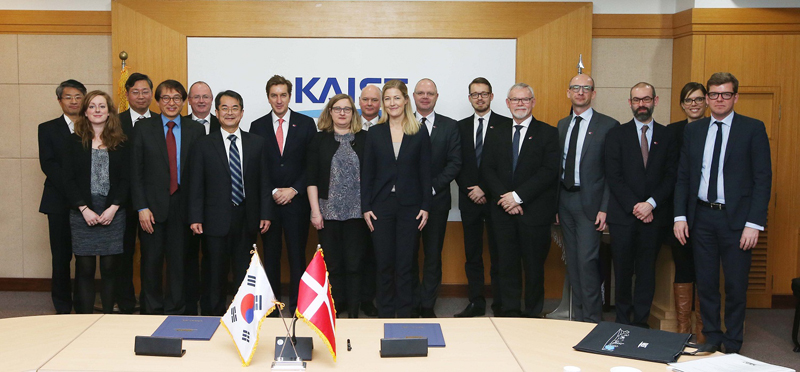 Danish Minister for Higher Education and Science Visits KAIST
Sofie Carsten Nielsen, the Minister for Higher Education and Science of Denmark, accompanied by her delegation, visited KAIST on January 21, 2015 to study outstanding cases of creative economy and to discuss methods of cooperation.
Her delegation included other distinguished members including Thomas Lehmann, the Danish ambassador to Korea, Peter Olesen, Chairman of Innovation Foundation Denmark Governing Board, and Martin Bendsøe, Senior Vice President and Dean of Technical University of Denmark.
After attending the "Electronic Communication Double Degree Agreement" signing ceremony between KAIST’s Department of Electrical Engineering and the Technical University of Denmark, Minister Nielsen visited KAIST’s Institute of Entrepreneurship to observe bilateral industry-university collaborations between KAIST and Denmark and discussed future development plans.
Also, the Grundfos Student Innovation Camp, sponsored by Grundfos, the world's largest pump manufacturer based in Denmark, took place at KAIST from October 26-31, 2014 where Grundfos professionals as well as students from Seoul National University, KAIST, and Technical University of Denmark (DTU) exchanged ideas and opinions on energy efficiency.
KAIST is currently conducting 19 collaborative projects including seven joint researches and seven joint degrees with DTU.
Minister Sofie Carsten Nielsen stands fifth from the left in the front row in the first picture below.
2015.01.27 View 10632
Danish Minister for Higher Education and Science Visits KAIST
Sofie Carsten Nielsen, the Minister for Higher Education and Science of Denmark, accompanied by her delegation, visited KAIST on January 21, 2015 to study outstanding cases of creative economy and to discuss methods of cooperation.
Her delegation included other distinguished members including Thomas Lehmann, the Danish ambassador to Korea, Peter Olesen, Chairman of Innovation Foundation Denmark Governing Board, and Martin Bendsøe, Senior Vice President and Dean of Technical University of Denmark.
After attending the "Electronic Communication Double Degree Agreement" signing ceremony between KAIST’s Department of Electrical Engineering and the Technical University of Denmark, Minister Nielsen visited KAIST’s Institute of Entrepreneurship to observe bilateral industry-university collaborations between KAIST and Denmark and discussed future development plans.
Also, the Grundfos Student Innovation Camp, sponsored by Grundfos, the world's largest pump manufacturer based in Denmark, took place at KAIST from October 26-31, 2014 where Grundfos professionals as well as students from Seoul National University, KAIST, and Technical University of Denmark (DTU) exchanged ideas and opinions on energy efficiency.
KAIST is currently conducting 19 collaborative projects including seven joint researches and seven joint degrees with DTU.
Minister Sofie Carsten Nielsen stands fifth from the left in the front row in the first picture below.
2015.01.27 View 10632 -
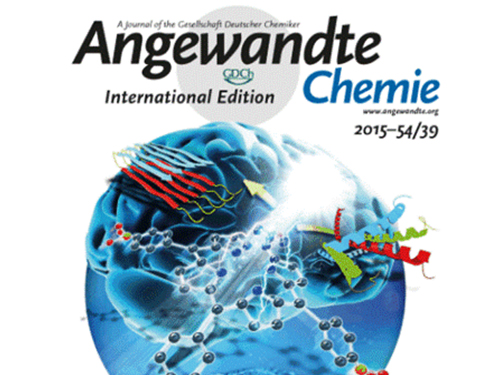 Light Driven Drug-Enzyme Reaction Catalytic Platform Developed
Low Cost Dye Used, Hope for Future Development of High Value Medicinal Products to Treat Cardiovascular Disease and Gastric Ulcers
A KAIST research team from the Departments of Materials Science and Engineering and of Chemical and Biomolecular Engineering, led respectively by Professors Chan Beum Park and Ki Jun Jeong, has developed a new reaction platform to induce drug-enzyme reaction using light.
The research results were published in the journal Angewandte Chemie, International Edition, as the back cover on 12 January 2015.
Applications of this technology may enable production of high value products such as medicine for cardiovascular disease and gastric ulcers, for example Omeprazole, using an inexpensive dye.
Cytochrome P450 is an enzyme involved in oxidative response which has an important role in drug and hormone metabolism in organisms. It is known to be responsible for metabolism of 75% of drugs in humans and is considered a fundamental factor in new drug development.
To activate cytochrome P450, the enzyme must receive an electron by reducing the enzyme. In addition, NADPH (a coenzyme) needs to be present. However, since NADPH is expensive, the use of cytochrome P450 was limited to the laboratory and has not yet been commercialized.
The research team used photosensitizer eosin Y instead of NADPH to develop “Whole Cell Photo-Biocatalysis” in bacteria E. coli. By exposing inexpensive eosin Y to light, cytochrome P450 reaction was catalyzed to produce the expensive metabolic material.
Professor Park said, “This research enabled industrial application of cytochrome P450 enzyme, which was previous limited.” He continued, “This technology will help greatly in producing high value medical products using cytochrome P450 enzyme.”
The research was funded by the National Research Foundation of Korea and KAIST's High Risk High Return Project (HRHRP).
Figure 1: Mimetic Diagram of Electron Transfer from Light to Cytochrome P450 Enzyme via Eosin Y, EY
Figure 2: The back cover of Angewandte Chemie published on 12 January 2015, showing the research results
2015.01.26 View 11522
Light Driven Drug-Enzyme Reaction Catalytic Platform Developed
Low Cost Dye Used, Hope for Future Development of High Value Medicinal Products to Treat Cardiovascular Disease and Gastric Ulcers
A KAIST research team from the Departments of Materials Science and Engineering and of Chemical and Biomolecular Engineering, led respectively by Professors Chan Beum Park and Ki Jun Jeong, has developed a new reaction platform to induce drug-enzyme reaction using light.
The research results were published in the journal Angewandte Chemie, International Edition, as the back cover on 12 January 2015.
Applications of this technology may enable production of high value products such as medicine for cardiovascular disease and gastric ulcers, for example Omeprazole, using an inexpensive dye.
Cytochrome P450 is an enzyme involved in oxidative response which has an important role in drug and hormone metabolism in organisms. It is known to be responsible for metabolism of 75% of drugs in humans and is considered a fundamental factor in new drug development.
To activate cytochrome P450, the enzyme must receive an electron by reducing the enzyme. In addition, NADPH (a coenzyme) needs to be present. However, since NADPH is expensive, the use of cytochrome P450 was limited to the laboratory and has not yet been commercialized.
The research team used photosensitizer eosin Y instead of NADPH to develop “Whole Cell Photo-Biocatalysis” in bacteria E. coli. By exposing inexpensive eosin Y to light, cytochrome P450 reaction was catalyzed to produce the expensive metabolic material.
Professor Park said, “This research enabled industrial application of cytochrome P450 enzyme, which was previous limited.” He continued, “This technology will help greatly in producing high value medical products using cytochrome P450 enzyme.”
The research was funded by the National Research Foundation of Korea and KAIST's High Risk High Return Project (HRHRP).
Figure 1: Mimetic Diagram of Electron Transfer from Light to Cytochrome P450 Enzyme via Eosin Y, EY
Figure 2: The back cover of Angewandte Chemie published on 12 January 2015, showing the research results
2015.01.26 View 11522 -
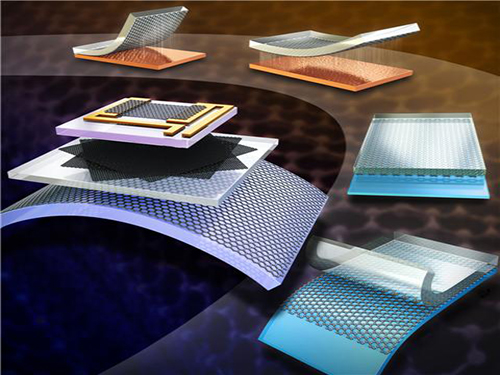 KAIST Develops a Method to Transfer Graphene by Stamping
Professor Sung-Yool Choi’s research team from KAIST's Department of Electrical Engineering has developed a technique that can produce a single-layer graphene from a metal etching. Through this, transferring a graphene layer onto a circuit board can be done as easily as stamping a seal on paper.
The research findings were published in the January 14th issue of Small as the lead article.
This technology will allow different types of wafer transfer methods such as transfer onto a surface of a device or a curved surface, and large surface transfer onto a 4 inch wafer. It will be applied in the field of wearable smart gadgets through commercialization of graphene electronic devices.
The traditional method used to transfer graphene onto a circuit board is a wet transfer. However, it has some drawbacks as the graphene layer can be damaged or contaminated during the transfer process from residue from the metal etching. This may affect the electrical properties of the transferred graphene.
After a graphene growth substrate formed on a catalytic metal substrate is pretreated in an aqueous poly vinyl alcohol (PVA) solution, a PVA film forms on the pretreated substrate. The substrate and the graphene layers bond strongly. The graphene is lifted from the growth substrate by means of an elastomeric stamp.
The delaminated graphene layer is isolated state from the elastomeric stamp and thus can be freely transferred onto a circuit board. As the catalytic metal substrate can be reused and does not contain harmful chemical substances, such transfer method is very eco-friendly.
Professor Choi said, “As the new graphene transfer method has a wide range of applications and allows a large surface transfer, it will contribute to the commercialization of graphene electronic devices.” He added that “because this technique has a high degree of freedom in transfer process, it has a variety of usages for graphene and 2 dimensional nano-devices.”
This research was sponsored by the Ministry of Science, ICT and Future Planning, the Republic of Korea.
Figure 1. Cover photo of the journal Small which illustrates the research findings
Figure 2. Above view of Graphene layer transferred through the new method
Figure 3. Large surface transfer of Graphene
2015.01.23 View 12380
KAIST Develops a Method to Transfer Graphene by Stamping
Professor Sung-Yool Choi’s research team from KAIST's Department of Electrical Engineering has developed a technique that can produce a single-layer graphene from a metal etching. Through this, transferring a graphene layer onto a circuit board can be done as easily as stamping a seal on paper.
The research findings were published in the January 14th issue of Small as the lead article.
This technology will allow different types of wafer transfer methods such as transfer onto a surface of a device or a curved surface, and large surface transfer onto a 4 inch wafer. It will be applied in the field of wearable smart gadgets through commercialization of graphene electronic devices.
The traditional method used to transfer graphene onto a circuit board is a wet transfer. However, it has some drawbacks as the graphene layer can be damaged or contaminated during the transfer process from residue from the metal etching. This may affect the electrical properties of the transferred graphene.
After a graphene growth substrate formed on a catalytic metal substrate is pretreated in an aqueous poly vinyl alcohol (PVA) solution, a PVA film forms on the pretreated substrate. The substrate and the graphene layers bond strongly. The graphene is lifted from the growth substrate by means of an elastomeric stamp.
The delaminated graphene layer is isolated state from the elastomeric stamp and thus can be freely transferred onto a circuit board. As the catalytic metal substrate can be reused and does not contain harmful chemical substances, such transfer method is very eco-friendly.
Professor Choi said, “As the new graphene transfer method has a wide range of applications and allows a large surface transfer, it will contribute to the commercialization of graphene electronic devices.” He added that “because this technique has a high degree of freedom in transfer process, it has a variety of usages for graphene and 2 dimensional nano-devices.”
This research was sponsored by the Ministry of Science, ICT and Future Planning, the Republic of Korea.
Figure 1. Cover photo of the journal Small which illustrates the research findings
Figure 2. Above view of Graphene layer transferred through the new method
Figure 3. Large surface transfer of Graphene
2015.01.23 View 12380 -
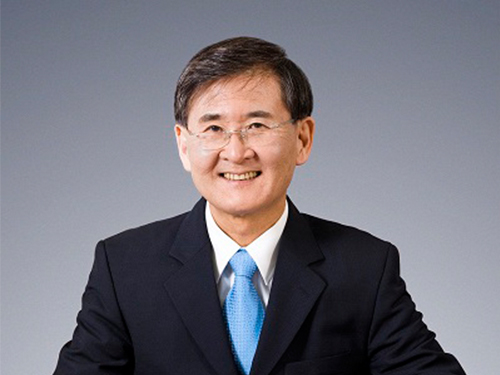 President Kang to Present at the World Economic Forum
President Sung-Mo Kang of KAIST will attend the World Economic Forum (WEF) as a member of the Global University Leaders Forum (GULF) to represent KAIST. GULF is attended by the world leaders of education and research. Its members represent 26 universities drawn from around the world including Harvard University. KAIST is the only Korean university to be invited.
WEF will be held in Davos, Switzerland, for four days, starting on 21 January 2015. He will discuss the future of higher education, the issues and solutions of science and society at GULF.
By attending GULF, KAIST expects to strengthen its network with top universities around the world and raise KAIST’s profile on an international basis. President Kang said, “The invitation for KAIST to attend the GULF is an evidence of its raised global status.” He continued, “I will show the innovative and challenging achievements KAIST has made to the leaders of the world.”
The theme of the 2015 World Economic Forum Annual Meeting 2015 is “The New Global Context” to discuss the integration of economic growth and society, employment and work force, environment and resource scarcity, the future of the Internet, and international crime and anti-corruption.
The World Economic Forum was established in 1971 by Klaus Schwab who is also its Executive Chairman. More than 2,500 people including German Chancellor Angela Merkel, French President François Hollande, Chinese Premier Li Keqiang, Google President Eric Schmidt, and Microsoft CEO Satya Nadella will attend this year's forum.
2015.01.22 View 9575
President Kang to Present at the World Economic Forum
President Sung-Mo Kang of KAIST will attend the World Economic Forum (WEF) as a member of the Global University Leaders Forum (GULF) to represent KAIST. GULF is attended by the world leaders of education and research. Its members represent 26 universities drawn from around the world including Harvard University. KAIST is the only Korean university to be invited.
WEF will be held in Davos, Switzerland, for four days, starting on 21 January 2015. He will discuss the future of higher education, the issues and solutions of science and society at GULF.
By attending GULF, KAIST expects to strengthen its network with top universities around the world and raise KAIST’s profile on an international basis. President Kang said, “The invitation for KAIST to attend the GULF is an evidence of its raised global status.” He continued, “I will show the innovative and challenging achievements KAIST has made to the leaders of the world.”
The theme of the 2015 World Economic Forum Annual Meeting 2015 is “The New Global Context” to discuss the integration of economic growth and society, employment and work force, environment and resource scarcity, the future of the Internet, and international crime and anti-corruption.
The World Economic Forum was established in 1971 by Klaus Schwab who is also its Executive Chairman. More than 2,500 people including German Chancellor Angela Merkel, French President François Hollande, Chinese Premier Li Keqiang, Google President Eric Schmidt, and Microsoft CEO Satya Nadella will attend this year's forum.
2015.01.22 View 9575 -
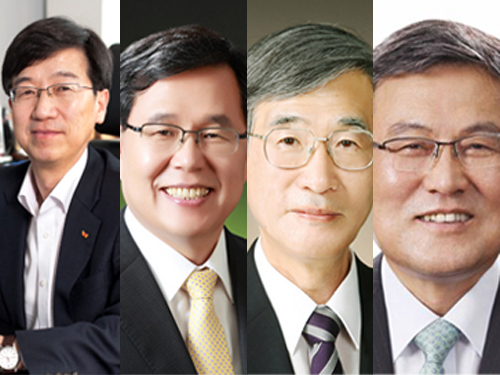 KAIST Announces the Recipients of Distinguished Alumni Awards
The KAIST Alumni Association (KAA) announced four “Proud KAIST Alumni” awards recipients for the year 2014: Sung-Wook Park, the Chief Executive Officer and President of SK Hynix; Seung Ho Shin, the President of Kangwon National University; Kew-Ho Lee, the President of the Korea Research Institute of Chemical Technology; and Mun-Kee Choi, the former Minister of Science, ICT and Future Planning of the Republic of Korea. The award ceremony took place during the 2015 KAA’s New Year's ceremony on January 17, 2015 at the Palace Hotel in Seoul.
Sung-Wook Park (M.S. ’82 and Ph.D. ’88, Department of Materials Science and Engineering), the Chief Executive Officer and President of SK Hynix, has worked as an expert in the field of memory semi-conductors for the past 30 years. He developed innovative technology and improved production efficiency, enabling the Korean semi-conductor industry to become a global leader.
Seung Ho Shin (M.S. ’79 and Ph.D. ’87, Department of Physics), the President of Kangwon National University (KNU), worked in the field of optical information processing, producing excellent research achievements and teaching the next generation of scientists. As the president of KNU, he has set an exemplary leadership in higher education.
Kew-Ho Lee (M.S. ’75, Department of Chemistry), the President of the Korea Research Institute of Chemical Technology, pioneered the field of separation film production which contributed greatly to Korean technological developments. He led several domestic and international societies to facilitate dynamic exchanges between industry and academia and with the international community.
Mun-Kee Choi (M.S. ’76, Department of Industrial and Systems Engineering), the former Minister of Science, ICT and Future Planning, the Republic of Korea, is a great contributor to the information and communications technology in Korea, working as a leader in the field of broadband integrated service digital network. He is also an educator for gifted students in science and technology, and a manager of the Electronics and Telecommunications Research Institute.
The Alumni Association established the “Proud KAIST Alumni Awards” in 1992 to recognize its alumni’s outstanding contributions to Korea and KAIST.
Pictured from left to right, Sung-Wook Park (the Chief Executive Officer and President of SK Hynix), Seung Ho Shin (the President of Kangwon National University), Kew-Ho Lee (the President of the Korea Research Institute of Chemical Technology), and Mun-Kee Choi (the former Minister of Science, ICT and Future Planning)
2015.01.19 View 16930
KAIST Announces the Recipients of Distinguished Alumni Awards
The KAIST Alumni Association (KAA) announced four “Proud KAIST Alumni” awards recipients for the year 2014: Sung-Wook Park, the Chief Executive Officer and President of SK Hynix; Seung Ho Shin, the President of Kangwon National University; Kew-Ho Lee, the President of the Korea Research Institute of Chemical Technology; and Mun-Kee Choi, the former Minister of Science, ICT and Future Planning of the Republic of Korea. The award ceremony took place during the 2015 KAA’s New Year's ceremony on January 17, 2015 at the Palace Hotel in Seoul.
Sung-Wook Park (M.S. ’82 and Ph.D. ’88, Department of Materials Science and Engineering), the Chief Executive Officer and President of SK Hynix, has worked as an expert in the field of memory semi-conductors for the past 30 years. He developed innovative technology and improved production efficiency, enabling the Korean semi-conductor industry to become a global leader.
Seung Ho Shin (M.S. ’79 and Ph.D. ’87, Department of Physics), the President of Kangwon National University (KNU), worked in the field of optical information processing, producing excellent research achievements and teaching the next generation of scientists. As the president of KNU, he has set an exemplary leadership in higher education.
Kew-Ho Lee (M.S. ’75, Department of Chemistry), the President of the Korea Research Institute of Chemical Technology, pioneered the field of separation film production which contributed greatly to Korean technological developments. He led several domestic and international societies to facilitate dynamic exchanges between industry and academia and with the international community.
Mun-Kee Choi (M.S. ’76, Department of Industrial and Systems Engineering), the former Minister of Science, ICT and Future Planning, the Republic of Korea, is a great contributor to the information and communications technology in Korea, working as a leader in the field of broadband integrated service digital network. He is also an educator for gifted students in science and technology, and a manager of the Electronics and Telecommunications Research Institute.
The Alumni Association established the “Proud KAIST Alumni Awards” in 1992 to recognize its alumni’s outstanding contributions to Korea and KAIST.
Pictured from left to right, Sung-Wook Park (the Chief Executive Officer and President of SK Hynix), Seung Ho Shin (the President of Kangwon National University), Kew-Ho Lee (the President of the Korea Research Institute of Chemical Technology), and Mun-Kee Choi (the former Minister of Science, ICT and Future Planning)
2015.01.19 View 16930 -
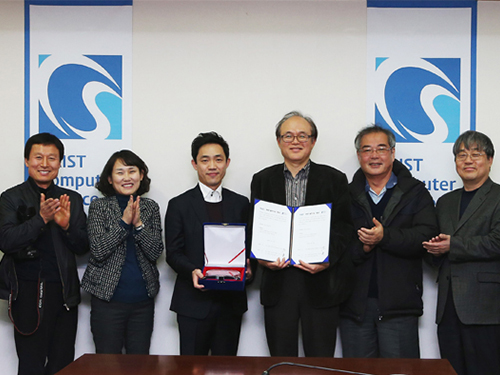 A Doctoral Student of KAIST Donates Scholarship to the University
Sang-Won Seo, a Ph.D. student at the Department of Computer Science at KAIST, recently donated USD 9,300 to the university to support joint degree programs with international universities. He received dual degrees himself for the Bachelor of Science both from KAIST and the Technical University of Berlin in Germany in 2009.
Explaining his reason to donate, Sang-Won said, “I have always felt grateful for the support I received from KAIST during my study abroad. I’m glad to find an opportunity to return to my alma mater what I have received.”
In the picture below, Sang-Won Seo (fourth from the left) and his adviser Professor Seungryoul Maeng (to the right next to Seo) pose together holding the certificate of appreciation on January 14, 2015.
2015.01.16 View 6356
A Doctoral Student of KAIST Donates Scholarship to the University
Sang-Won Seo, a Ph.D. student at the Department of Computer Science at KAIST, recently donated USD 9,300 to the university to support joint degree programs with international universities. He received dual degrees himself for the Bachelor of Science both from KAIST and the Technical University of Berlin in Germany in 2009.
Explaining his reason to donate, Sang-Won said, “I have always felt grateful for the support I received from KAIST during my study abroad. I’m glad to find an opportunity to return to my alma mater what I have received.”
In the picture below, Sang-Won Seo (fourth from the left) and his adviser Professor Seungryoul Maeng (to the right next to Seo) pose together holding the certificate of appreciation on January 14, 2015.
2015.01.16 View 6356 -
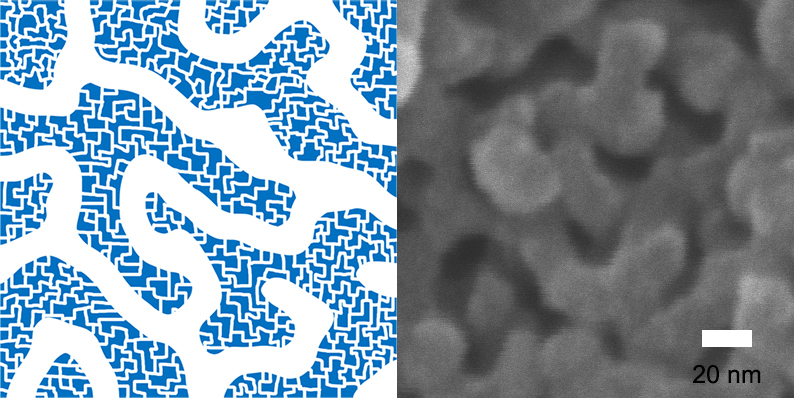 Hierarchically-Porous Polymers with Fast Absorption
KAIST's Professor Myungeun Seo and his research team from the Graduate School of Nanoscience and Technology has developed a method to form micropores of less than 2 nanometers within porous polymers where 10 nanometers long mesopores connect like a net. The advantage of the porous polymers is fast absorption of molecules.
Porous polymers with micropores of less than 2 nanometers, like a zeolite, have a large surface area. They are used as a means to store hydrogen-based molecules or as a catalytic support that can be used as a surface to convert a material into a desired form. However, because the size of the pores in its path was too small for the molecules, it took a long time to spread into the pores and reach the surface.
To reach the surface efficiently, a lung cell or the vein of a leaf has a structure wherein the pores are subdivided into different sizes so that the molecule can spread throughout the organ. A technology that can create not only micropores but also bigger pores was necessary in order to create such structure.
The research team solved the issue by implementing a "self-assembly" of block polymers to easily form a net-like nanostructure from mesopores of 10 nanometers.
The team created hierarchically-porous polymers consisting of two different types of pores by using a hypercrosslinking reaction along with the "self-assembly" method. The reaction creates micropores within the chain after the polymer chain is confined by a chemical bond.
This porous polymer has micropores that are smaller than 2 nanometers on the walls of mesopores while 10 nanometers long mesopores forming 3-dimensional net structures. Because of the "self-assembly" method, the size of mesopores can be adjusted within the range of 6 to 15 nanometers.
This is the first case where a porous polymer has both well-defined mesopores and micropores. The research team verified the effect of hierarchically-porous structures on absorption of molecules by confirming that the porous polymer had faster absorption speeds than a polymer consisting only of micropores.
Professor Seo said, “The study has found a simple way to create different sizes of pores within a polymer.” He expected that the hierarchically-porous polymers can be used as a catalytic support in which fast diffusion of molecules is essential, or for molecule collection.
The research was sponsored by National Research Foundation of Korea and published online in the Journal of the American Chemical Society.
Figure 1 – Net-like Structure of Hierarchically-Porous Polymers with Mesopores and Micropores on the walls of Mesopores.
Figure 2 - Hierarchically-Porous Polymers
Figure 3 – Comparison of Porous-Polymers consisting of Mesopores only (left), and Mesopores and Micropores (right)
2015.01.13 View 9641
Hierarchically-Porous Polymers with Fast Absorption
KAIST's Professor Myungeun Seo and his research team from the Graduate School of Nanoscience and Technology has developed a method to form micropores of less than 2 nanometers within porous polymers where 10 nanometers long mesopores connect like a net. The advantage of the porous polymers is fast absorption of molecules.
Porous polymers with micropores of less than 2 nanometers, like a zeolite, have a large surface area. They are used as a means to store hydrogen-based molecules or as a catalytic support that can be used as a surface to convert a material into a desired form. However, because the size of the pores in its path was too small for the molecules, it took a long time to spread into the pores and reach the surface.
To reach the surface efficiently, a lung cell or the vein of a leaf has a structure wherein the pores are subdivided into different sizes so that the molecule can spread throughout the organ. A technology that can create not only micropores but also bigger pores was necessary in order to create such structure.
The research team solved the issue by implementing a "self-assembly" of block polymers to easily form a net-like nanostructure from mesopores of 10 nanometers.
The team created hierarchically-porous polymers consisting of two different types of pores by using a hypercrosslinking reaction along with the "self-assembly" method. The reaction creates micropores within the chain after the polymer chain is confined by a chemical bond.
This porous polymer has micropores that are smaller than 2 nanometers on the walls of mesopores while 10 nanometers long mesopores forming 3-dimensional net structures. Because of the "self-assembly" method, the size of mesopores can be adjusted within the range of 6 to 15 nanometers.
This is the first case where a porous polymer has both well-defined mesopores and micropores. The research team verified the effect of hierarchically-porous structures on absorption of molecules by confirming that the porous polymer had faster absorption speeds than a polymer consisting only of micropores.
Professor Seo said, “The study has found a simple way to create different sizes of pores within a polymer.” He expected that the hierarchically-porous polymers can be used as a catalytic support in which fast diffusion of molecules is essential, or for molecule collection.
The research was sponsored by National Research Foundation of Korea and published online in the Journal of the American Chemical Society.
Figure 1 – Net-like Structure of Hierarchically-Porous Polymers with Mesopores and Micropores on the walls of Mesopores.
Figure 2 - Hierarchically-Porous Polymers
Figure 3 – Comparison of Porous-Polymers consisting of Mesopores only (left), and Mesopores and Micropores (right)
2015.01.13 View 9641 -
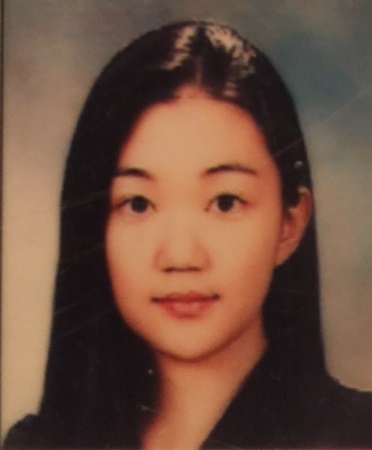 Professor Sunyoung Park Receives an Award from the Minister of Strategy and Finance of Korea
Professor Sunyoung Park, the Department of Industrial and Systems Engineering at KAIST, received an award from the Deputy Prime Minister and the Minister of Strategy and Finance of the Republic of Korea on December 31, 2014 in recognition of her contribution to the Korean economy. Known as an expert in macroeconomics and finance in Korea, Professor Park has conducted research in macroeconomic policies and capital flows.
Recently, Professor Park attended the 18th ASEAN+3 (Korea, Japan, and China) Finance and Central Bank Deputies’ Meeting held in Tokyo, Japan, on December 3-5, 2014 and presented a paper on the economic policies of Asian and G20 nations, receiving positive responses from the participants.
At the award ceremony, she said, “With continuous support from the government and collaborations with regional partners, I hope that my research will help Korea and the Asian economies grow further.”
2015.01.06 View 8369
Professor Sunyoung Park Receives an Award from the Minister of Strategy and Finance of Korea
Professor Sunyoung Park, the Department of Industrial and Systems Engineering at KAIST, received an award from the Deputy Prime Minister and the Minister of Strategy and Finance of the Republic of Korea on December 31, 2014 in recognition of her contribution to the Korean economy. Known as an expert in macroeconomics and finance in Korea, Professor Park has conducted research in macroeconomic policies and capital flows.
Recently, Professor Park attended the 18th ASEAN+3 (Korea, Japan, and China) Finance and Central Bank Deputies’ Meeting held in Tokyo, Japan, on December 3-5, 2014 and presented a paper on the economic policies of Asian and G20 nations, receiving positive responses from the participants.
At the award ceremony, she said, “With continuous support from the government and collaborations with regional partners, I hope that my research will help Korea and the Asian economies grow further.”
2015.01.06 View 8369 -
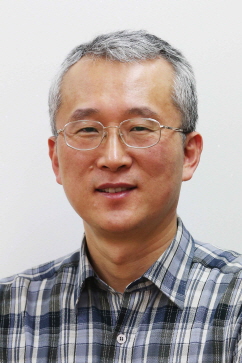 Professor Eunjoon Kim Is KAIST's Person of the Year 2014
KAIST announced that it has named Chair Professor Eunjoon Kim of the Department of Biological Sciences as its “Person of the Year 2014.” The award ceremony took place at the auditorium on campus on January 5, 2014.
Established in 2001, the award has been presented to a KAIST faculty member who has made great achievements in research and education, thereby contributing to the advancement of KAIST.
Professor Kim was the first to identify the mechanism of synapse formation between neurons during his post-doctoral program at Harvard Medical School in 1995. The research was published in Nature.
In 2011, Professor Kim discovered that the lack of protein GIT1, a neuronal synapse in the brain, caused ADHD (Attention Deficit Hyperactivity Disorder). He is widely recognized for his work concerning synapse proteins and brain disease related research that set the foundation for future medical developments.
In his award speech, Professor Kim said, “Whenever a research finding concerning a new drug therapy or research is published, I receive many inquiries from the parents of children with ADHD or autism. As a scientist, I would like to focus my research ultimately to help those in pain, rather than just pursuing research excellence or reputation.”
2015.01.06 View 11513
Professor Eunjoon Kim Is KAIST's Person of the Year 2014
KAIST announced that it has named Chair Professor Eunjoon Kim of the Department of Biological Sciences as its “Person of the Year 2014.” The award ceremony took place at the auditorium on campus on January 5, 2014.
Established in 2001, the award has been presented to a KAIST faculty member who has made great achievements in research and education, thereby contributing to the advancement of KAIST.
Professor Kim was the first to identify the mechanism of synapse formation between neurons during his post-doctoral program at Harvard Medical School in 1995. The research was published in Nature.
In 2011, Professor Kim discovered that the lack of protein GIT1, a neuronal synapse in the brain, caused ADHD (Attention Deficit Hyperactivity Disorder). He is widely recognized for his work concerning synapse proteins and brain disease related research that set the foundation for future medical developments.
In his award speech, Professor Kim said, “Whenever a research finding concerning a new drug therapy or research is published, I receive many inquiries from the parents of children with ADHD or autism. As a scientist, I would like to focus my research ultimately to help those in pain, rather than just pursuing research excellence or reputation.”
2015.01.06 View 11513 -
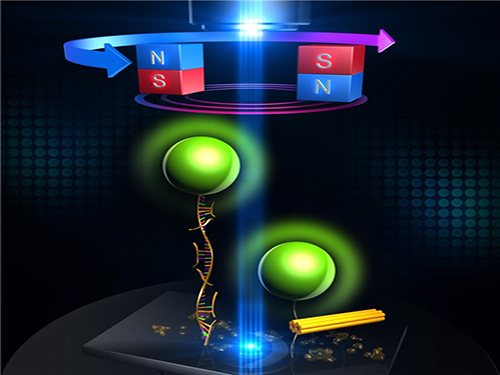 An Advanced Method of DNA Nanostructure Formation Developed
Professor Tae-Young Yoon’s research team from the Department of Physics at KAIST has developed a new method to form DNA nanostructures by using magnetic tweezers to observe and to induce the formation of the structure in real time.
Unlike traditional designs of "DNA origami" which relies on thermal or chemical annealing methods, the new technology utilizes a completely different dynamic in DNA folding. This allows the folding to be done within only ten minutes.
Developed in 2006, the "DNA origami" allows a long skeleton of DNA to be folded into an arbitrary structure by using small stapler DNA pieces. This has been a prominent method in DNA nanotechnology.
However, the traditional technology which adopts thermal processes could not control the DNA formation during the folding because every interaction among DNAs occurs simultaneously. Thus, the thermal processes, which take dozens of hours to complete, had to be repeated multiple times in order to find the optimal condition.
The research team designed a DNA folding using uni-molecular magnetic tweezers that applied force to a single DNA molecule while measuring the state of the DNA. Through this technology, they were able to induce the formation of DNA nanostructure and observe it at the same time.
During high temperature heat treatment, the first stage of conventional thermal processes, the internal structure of the long skeleton DNA untangles. To induce such state, after attaching one side of the skeleton DNA to the surface of glass and the other side to a magnetic material, the team unfolded the internal structure of the DNA by pulling the two sides apart with magnetic force.
Unlike the conventional thermal processes, this method lets the stapler DNA swiftly adhere to the skeleton DNA within a minute because the sites are revealed at room temperature.
After the stapler pieces connected to the skeleton, the team removed the magnetic force. Next, the structure folded through self-assembly as the stapler DNAs stuck to different sites on the skeleton DNA.
Professor Yoon said, “With the existing thermal methods, we could not differentiate the reactions of the DNA because the response of each DNA pieces mutually interacted with each other.” He added that “Using the magnetic tweezers, we were able to sort the process of DNA nanostructure formation into a series of reactions of DNA molecules that are well known, and shorten the time taken for formation in only ten minutes.”
He commented, “This nanostructure formation method will enable us to create more intricate and desirable DNA nanostructures by programming the folding of DNA origami structures.”
Conducted by Dr. Woori Bae under the guidance of Professor Yoon, the research findings were published online in the December 4th issue of Nature Communications.
Figure 1: Uni-molecular magnetic tweezers orchestrating the DNA nanostructure formation
Figure 2: The evolution of DNA nanostructure formation using magnetic tweezers. The DNA nanostructure with a 21-nanometer size was formed in about eight minutes.
2015.01.06 View 8030
An Advanced Method of DNA Nanostructure Formation Developed
Professor Tae-Young Yoon’s research team from the Department of Physics at KAIST has developed a new method to form DNA nanostructures by using magnetic tweezers to observe and to induce the formation of the structure in real time.
Unlike traditional designs of "DNA origami" which relies on thermal or chemical annealing methods, the new technology utilizes a completely different dynamic in DNA folding. This allows the folding to be done within only ten minutes.
Developed in 2006, the "DNA origami" allows a long skeleton of DNA to be folded into an arbitrary structure by using small stapler DNA pieces. This has been a prominent method in DNA nanotechnology.
However, the traditional technology which adopts thermal processes could not control the DNA formation during the folding because every interaction among DNAs occurs simultaneously. Thus, the thermal processes, which take dozens of hours to complete, had to be repeated multiple times in order to find the optimal condition.
The research team designed a DNA folding using uni-molecular magnetic tweezers that applied force to a single DNA molecule while measuring the state of the DNA. Through this technology, they were able to induce the formation of DNA nanostructure and observe it at the same time.
During high temperature heat treatment, the first stage of conventional thermal processes, the internal structure of the long skeleton DNA untangles. To induce such state, after attaching one side of the skeleton DNA to the surface of glass and the other side to a magnetic material, the team unfolded the internal structure of the DNA by pulling the two sides apart with magnetic force.
Unlike the conventional thermal processes, this method lets the stapler DNA swiftly adhere to the skeleton DNA within a minute because the sites are revealed at room temperature.
After the stapler pieces connected to the skeleton, the team removed the magnetic force. Next, the structure folded through self-assembly as the stapler DNAs stuck to different sites on the skeleton DNA.
Professor Yoon said, “With the existing thermal methods, we could not differentiate the reactions of the DNA because the response of each DNA pieces mutually interacted with each other.” He added that “Using the magnetic tweezers, we were able to sort the process of DNA nanostructure formation into a series of reactions of DNA molecules that are well known, and shorten the time taken for formation in only ten minutes.”
He commented, “This nanostructure formation method will enable us to create more intricate and desirable DNA nanostructures by programming the folding of DNA origami structures.”
Conducted by Dr. Woori Bae under the guidance of Professor Yoon, the research findings were published online in the December 4th issue of Nature Communications.
Figure 1: Uni-molecular magnetic tweezers orchestrating the DNA nanostructure formation
Figure 2: The evolution of DNA nanostructure formation using magnetic tweezers. The DNA nanostructure with a 21-nanometer size was formed in about eight minutes.
2015.01.06 View 8030